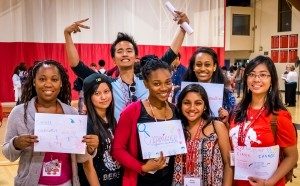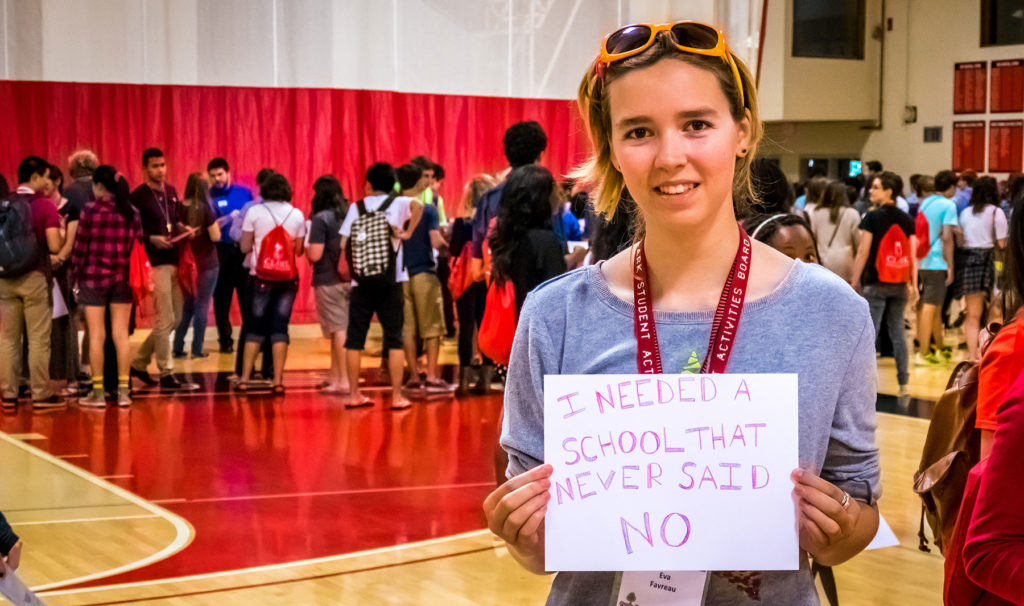
There’s an adage in journalism that everybody has a story.
The LEEP Center set out to prove it true in a fun and revealing Orientation exercise in which first-year students were asked to compose personal narratives that will help them chart their unique Clark paths.
The Aug. 23 session, “Telling Your Story,” held in Atwood Hall, introduced students to the LEEP Center advising model and used personal testimony to expose them to the breadth of offerings available to them at Clark University. Michelle Bata, associate dean and LEEP director, noted that academics, study abroad, internships and a host of other experiences will “shape your story and the person you will become four years from now.”
See more images from the “Telling Your Story” session here.
Three guest speakers took the stage to relate their own stories.
Clark University President David Angel recalled his days as a geography undergraduate at Cambridge University in England, revealing that while he studied hard and played sports, he realized after graduating that his university experience had been lacking. Under the British system, Angel said, one declares a major by 16 years old and remains entirely focused on that subject throughout his/her university career to the exclusion of other intellectual experiences. While he felt underserved by the institution, he also acknowledged, “It was my fault I hadn’t taken full advantage of the opportunities available to me.” Later, he reasoned, “We can do better, advise better, coach better.”

After arriving at Clark as a geography professor in the late 1980s, Angel said, some of his most productive research into economic development was conducted in collaboration with faculty from other disciplines — fortuitous “collisions” that offered fuller, more varied perspectives on the subject matter. As president, he told the newest Clarkies, he’s passionate about creating an education experience that not only allows students to take full advantage of Clark’s resources but will launch them effectively into productive lives and careers.
Katie Bogen ’15 assured the students that one’s path does not always follow a straight line. She entered Clark as a theater arts major, but a course about Latin American politics awakened an unknown academic passion. She switched her major to comparative politics with a Latin studies minor, though she exercised her creative muscles as a member, and now director, of the campus a cappella group Counterpoints.
Employing “Harry Potter” imagery, Bogen talked of securing LEEP and Barth internships that allowed her to move from “the castle of Clark” to create and lead workshops on gender, sex and sexuality, and reproductive health for immigrant female teens in Worcester. She’s now planning on applying for a Fulbright scholarship to conduct research on the availability of reproductive services to Guatemalan women.
“Clark forced me out of my comfort zone,” she said, urging the students to take risks and explore opportunities. Or, in Harry Potter terms, “battle the dragon and find the unicorn.”
Sanjiv Fernando ’16 recalled that he was a transfer student to Clark last year, sitting in Atwood Hall and considering his own path. The environmental studies major had a “burning passion” for wildlife since childhood that culminated in an extraordinary opportunity. Fernando received a $10,000 grant from Davis Projects for Peace, and, with additional funding as a LEEP Fellow, he oversaw the building and installation of leopard-proof mesh enclosures to project cattle in his native Sri Lanka. The enclosures helped provide income security for 12 farmers by keeping their animals safe, and, in turn, protected the endangered Sri Lankan leopards from being killed in retaliation.
“If a year ago someone told me I’d be on this stage talking about my LEEP project, I wouldn’t have believed you. But here I am. The great part is next time it could be you.”
Following the presentations in Atwood, the first-year student broke up into smaller advising groups where the students were given paper and crayons to depict on paper how their story opens. The question they were asked to answer through their drawings was: Why did you choose Clark?


